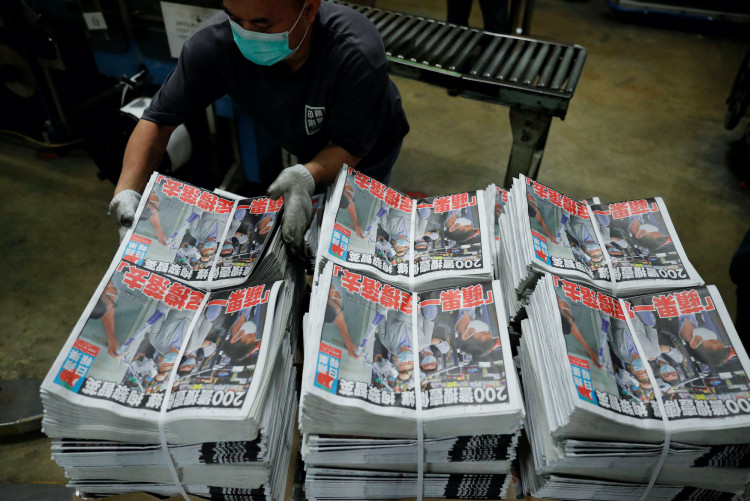Trading in Next Digital shares was suspended on the Hong Kong stock exchange Monday after the Security Bureau froze nearly HK$500 million ($64.4 million) in assets belonging to its controlling shareholder Jimmy Lai Chee-ying.
The temporary suspension was revealed just before the jailed media tycoon, facing three charges under the Beijing-imposed national security law, arrived at court to face unauthorized assembly charges relating to a 2019 National Day protest.
He later Monday pleaded guilty to organizing the protest along with nine prominent political activists.
Worries grew Monday over the pro-democracy media group's future after authorities froze assets of its jailed owner Jimmy Lai under a new national security law.
The shares will remain on a trading halt ahead of a company announcement regarding the freeze in Lai's assets, including his majority stake in the company, Next Digital said.
Meanwhile, Lai, veteran activist Albert Ho and eight others will plead guilty in a protest-related trial beginning Monday, as authorities in the Asian financial hub continue to prosecute prominent pro-democracy figures.
Lai, Ho and the rest will enter the plea related to organizing and attending an unauthorized assembly to mark China's National Day Oct. 1, 2019, Ho said late Sunday. "We will be pleading guilty," he said.
The move against Lai's assets raises worries about the future of Next Digital, which he has been keeping afloat with loans, although the company's chief executive has said that the frozen assets have no link with its bank accounts.
Given this is the first time a listed company has been targeted under the new security law imposed by China in 2020, it also fuels concerns about the broader investment environment in the Asian financial hub.
Lai, a democracy activist and staunch Beijing critic, was sentenced to 14 months in prison for taking part in unauthorized assemblies during anti-government protests in Hong Kong in 2019, and is among the most prominent arrests made under the security law.
Lai has a 71.26% stake in Next Digital worth around HK$350 million ($45 million) based Friday's closing share price.
But the freeze of assets belonging to the major shareholder will not affect company operations as the frozen assets have nothing to do with Next Digital's bank accounts, chief executive Cheung Kim-hung told the Apple Daily newspaper.
Next Digital runs Apple Daily, Hong Kong's most influential pro-democracy newspaper that has long been a thorn in the side of Hong Kong and Chinese authorities.
A senior management source at Apple Daily told Reuters last week, before the asset freeze was announced that the group had tried to "firewall" its media operations from Lai's other businesses, but they believed authorities still had ways to "neuter" the paper, without elaborating.
"It's simply a matter of if they want to do it. If they want to move (on us), they'll move," the source said.
Without fresh cash injections, Next Digital can only survive another nine or 10 months, Apple Daily cautioned Saturday, a day after authorities announced they had frozen Lai's assets.
A shareholder's loan of HK$756 million, of which HK$500 million had been drawn as of end-September, was an "important source of funding" and may not be available anymore given the freeze, the paper added.
The group's bank borrowings amounted to HK$262.3 million as of the end of September, repayable within three years. Its net cash position was HK$228.7 million at the time.
Apple Daily said revenue for the group had also come under pressure with "pro-China forces" in Hong Kong boycotting various advertising resources, making its operation "extremely difficult."
The paper reported Friday its Taiwan arm, set up in 2003, would stop publishing its print version given declining advertising revenue and more difficult business conditions in Hong Kong linked to politics.
Authorities say media freedom in the city is intact, but have warned China's national security is a red line.
Senior Hong Kong officials have warned Apple Daily about its coverage and flagged the introduction of a "fake news" law.
"I just hope that you know our friends outside can withstand the continuing oppression that we are witnessing in Hong Kong, especially with the media," Avery Ng, one of the 10 defendants in Monday's illegal assembly trial, said before entering court.





